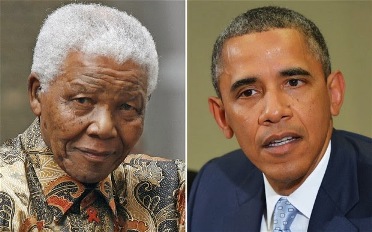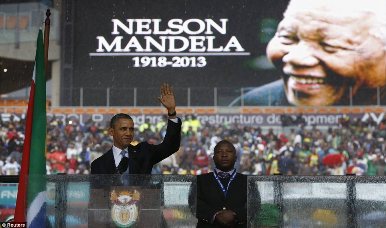One similarity is that barack obama and Nelson Mandela is that they both were first black president of a certain country. Nelson was the first black president in a black country and barack Obama was the first black president in a white country.
Not long before Barack Obama was first elected President of the United States, in October 2008 as the leader in waiting of the most powerful nation in the world, might be regarded as a worthy successor to the towering figure of Mandela. Certainly any comparison between both leaders Nelson Mandela and Barack Obama should recognize that they emerge out of very dissimilar family backgrounds, historical times, and national geographies.

Mandela was born in 1918, barack Obama some generations later in August 1961. Obama is American although of part-African descent; Mandela stems from a minor branch of a royal family. So far for these very reasons the parallels between them in terms of leadership style and approach are the more remarkable, as obviously are the connections that can be drawn between their political reputations and historical legacy, including remarkable charisma that unites them. Both of them embody that quality of individual personality. Both were devotedly aware from the beginning of their leadership that their good guidance might help found, consolidate, and safeguard traditions of democracy for their own countries. At the similar time they saw, too, that they, in themselves, could represent important sources of inspiration and legitimation for those national communities. Furthermore both were open to moulding their own symbol status, though Mandela perhaps more open and ostentatiously than Obama. For example, Mandela was always keen to play to the ways in which his own life or biography can be seen to underpin South Africa's long road to freedom. If Obama's victory in 2008 could be viewed as representing fulfilment of Martin Luther King's dream, this was something that he certainly signaled in his Acceptance and Inaugural Speeches in 2008 and 2009. Both Mandela and Obama were trained as lawyers, and share a devoted sense of the power of the word and symbol of verbal encouragement and protection.

Both the men also derived strength and inspiration from their African descent. As for Mandela, the pride in his family background and traditions that was instilled in him throughout his upbringing was essential for the resilience he showed in withstanding apartheid and feeling that he may well speak for all South Africans, black and white. In the case of both leaders, therefore, not merely their African descent other than how they embraced it, were key catalysts in the mix of character, personality, and achievement that underpinned their leadership. All through, both leaders have been concerned to resist and at all levels to work against the outsider status to which Africa and Africans were once relegated in history.
But possibly, the most persuasive obvious commonality between them lies in respect of their media performances. Mandela is more formal and stilted in his political rhetoric than to Obama, yet both leaders, building on their self-perceived messianic roles in history, have not been averse to striking prophetic note. Both barrack Obama's acceptance speeches have been particularly forceful in their reference to moving on from the suffering of past to a more hopeful and united future. His speech has known as an American nation into being in which African Americans regardless of their class have an equal status, and equal opportunities, to white Americans. In case of Mandela, he also had many speeches after his release in 1990 addressed his exhortatory and as ever performative remarks to the united South Africa. He said in his speech "Let freedom reign. Let a new age dawn." Here was the President in waiting announcing himself both to the world and to his strife-torn country as a man proceeding with caution, so far filled with hope, much like Barack Obama.